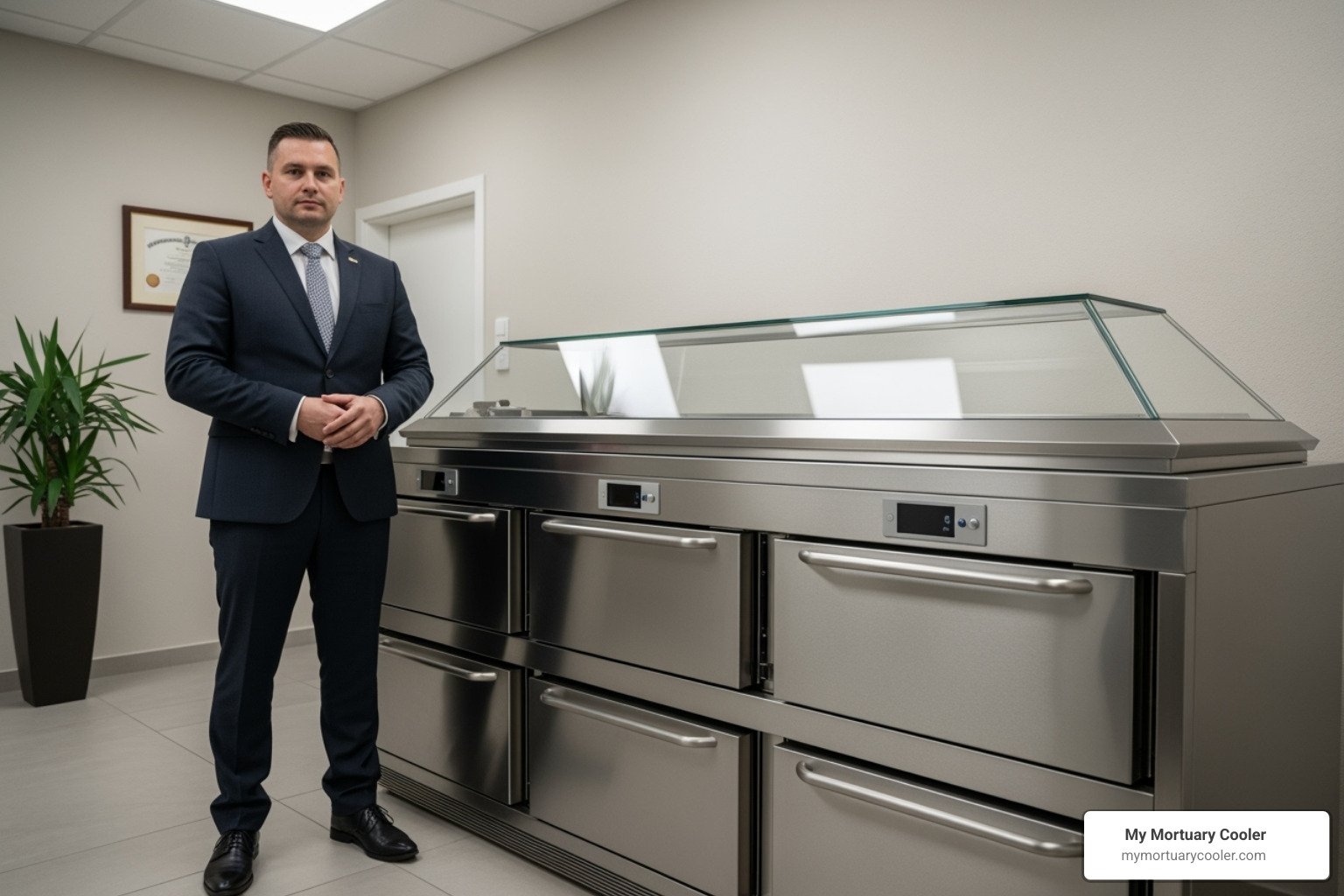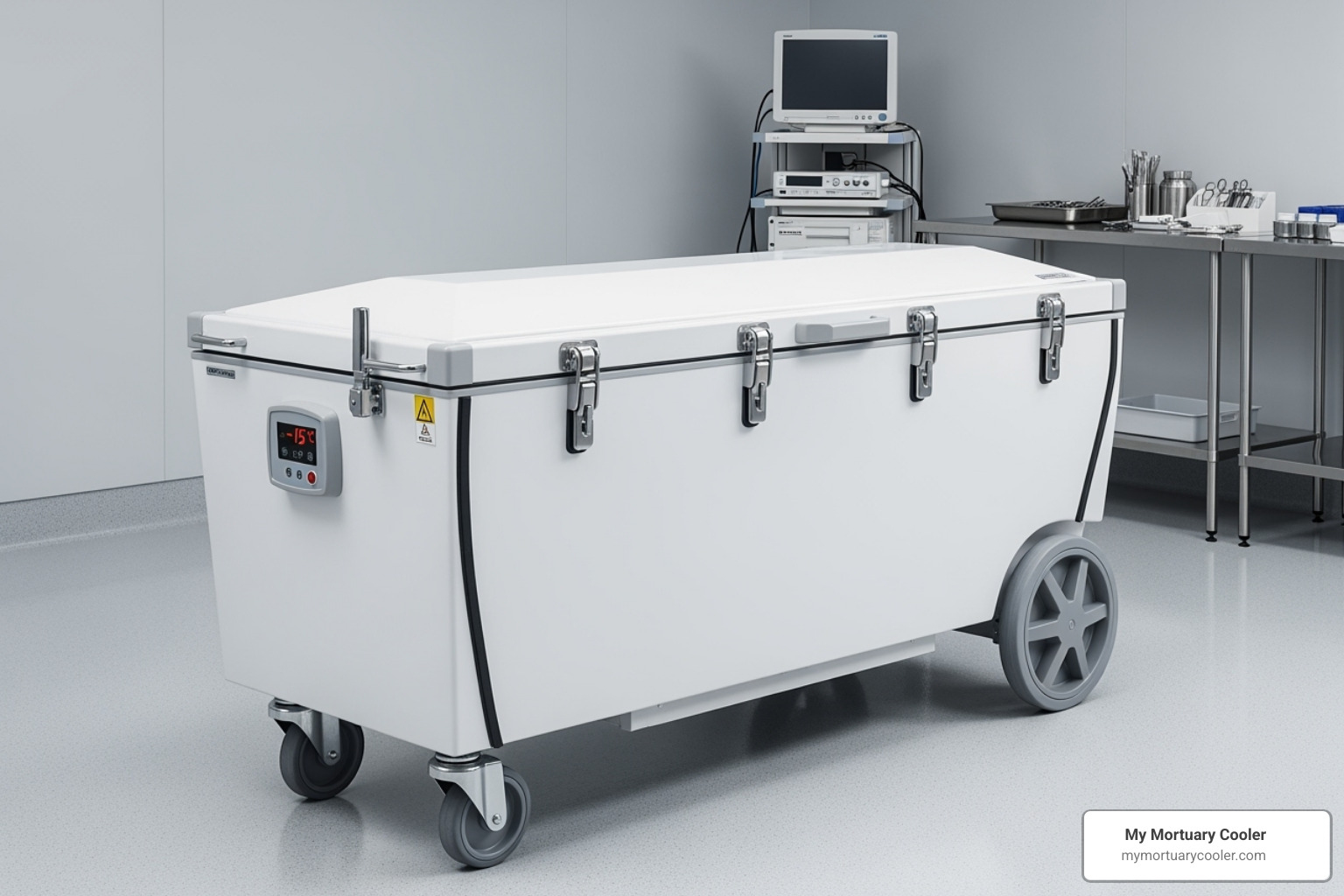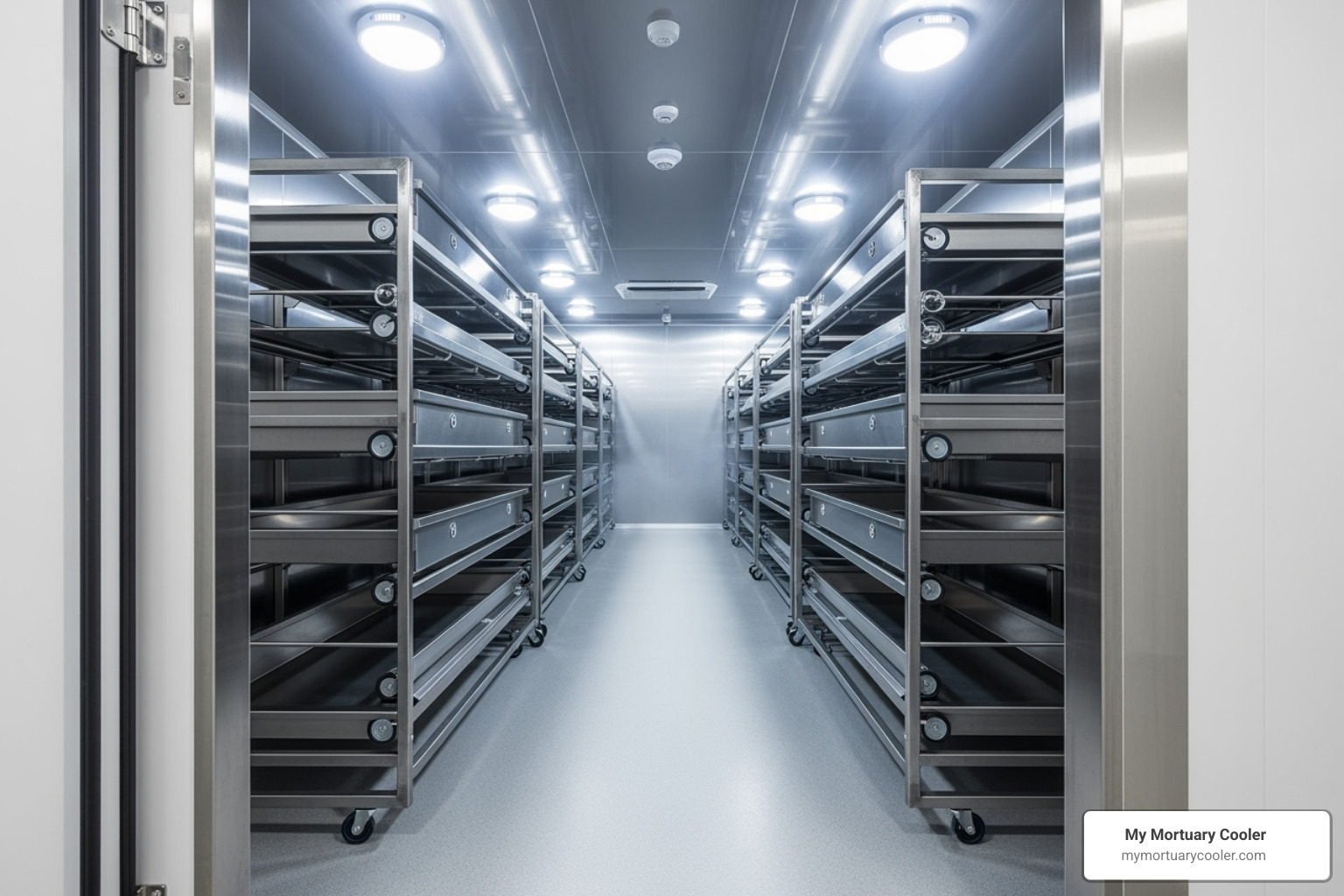The Foundation of Respectful Preservation
A body storage freezer is a vital piece of equipment for preserving human remains. These specialized units create a controlled environment that slows the natural process of decomposition, which is critical for several reasons.
What is a Body Storage Freezer and Why is it Essential?
A body storage freezer is a professional refrigeration unit designed to store deceased individuals. Its primary goal is to preserve the body, which is essential for:
- Dignified Care: Allowing families time to grieve and make funeral arrangements.
- Public Health: Preventing rapid decomposition and maintaining hygiene standards.
- Legal & Forensic Needs: Providing time for identification, autopsies, and investigations.
- Operational Efficiency: Offering a reliable solution for hospitals, funeral homes, and medical examiners.
These freezers operate between -2°C to -15°C, much colder than a standard mortuary cooler (2°C to 4°C). The lower temperatures enable longer-term preservation, ensuring remains are kept respectfully until final arrangements are made.

The Critical Role of Mortuary Refrigeration
When someone passes away, a body storage freezer is essential for providing families the time they need to grieve and make arrangements. These specialized units create a controlled environment that slows the natural decomposition process by maintaining precise temperatures, typically between -2°C to -15°C. This halts bacterial growth and preserves tissue integrity, providing dignity during a difficult time.
This allows families to gather from different locations and plan meaningful services without feeling rushed. For legal and forensic purposes, proper preservation is critical. It gives medical examiners time to conduct thorough investigations, as the integrity of evidence depends on maintaining the body in optimal condition.
Professional body storage freezers also address public health concerns by preventing the spread of pathogens and eliminating odors. This creates a safe, hygienic environment for funeral staff and grieving families. A reliable body storage freezer is the foundation of dignified after-death care, making compassionate, unhurried service possible.
For more insights into the broader context of mortuary refrigeration, explore our resources on mortuary refrigeration systems.
Who Uses Dead Body Freezer Boxes?
Professional body storage is a universal need across many facilities:
- Hospitals and medical centers require temporary storage, especially after hours, so families are not pressured into hasty decisions.
- Funeral homes are the most common users, needing flexible solutions to accommodate varying service schedules and caseloads.
- Medical examiners and coroners have demanding requirements for extended investigations, autopsies, and complex identification processes where preservation quality is paramount.
- Emergency response teams rely on portable and scalable storage during mass casualty events or natural disasters when normal infrastructure is overwhelmed.
- Ambulance providers in remote areas may use portable units for dignified transport and temporary holding over long distances.
Our equipment serves everyone from small-town funeral homes to major medical centers, ensuring every facility can maintain the highest standards of respectful care.

Understanding the Different Types of Body Storage Freezer
Choosing the right body storage freezer involves matching the unit's purpose to your facility's needs. Quality units feature modular construction, high-quality stainless steel, and superior insulation for durability and energy efficiency. The main decision depends on your space, capacity requirements, and whether you need a mobile or permanent solution.
For detailed information, our guide on funeral home body freezers covers the full range of options.
Portable Freezer Boxes
Portable freezer boxes offer maximum flexibility. These compact, mobile single-body units are ideal for smaller operations, overflow situations, or temporary use during maintenance. They roll on castor wheels, plug into standard electricity, and require no complex installation. Their versatility makes them popular with ambulance providers, emergency response teams, and for providing dignified solutions for home use during wakes.

Mortuary Cabinets (Static Freezers)
Mortuary cabinets are the standard for reliable, multi-body storage in a permanent installation. These static freezers are designed for daily use and long-term durability. Their key advantage is the use of individual chambers for each decedent, ensuring dignity and preventing cross-contamination. Capacity options range from 1-body models to 8+ body units, with 2, 3, 4, and 6-body configurations being popular. Standard construction uses durable SS201 stainless steel, with an option to upgrade to SS304 steel for superior corrosion resistance. These cabinets are engineered for fixed installation and long-term storage in facilities with steady volume.
Walk-In Mortuary Coolers and Freezers
For high-capacity operations, walk-in units offer the ultimate scalable solution. Using modular panels, these systems can be built to your exact specifications and available space. The scalable design allows you to expand as your needs grow, while custom layouts and body racks ensure efficient, organized storage. Capacities can range from 4-5 bodies to over 30. The modular construction also allows for relocation if needed, and high-quality units often come with ten-year warranties on panels, reflecting their durability.
For more on these larger systems, see our guide on mortuary cold rooms.

Key Features of a Professional Body Storage Freezer
Professional-grade units are distinguished by several key features:
- Digital Temperature Control: High-precision controls with real-time displays maintain stable temperatures, with some models like the MR-CP Series offering adjustable ranges from -30℃ to 10℃.
- High-Quality Compressors: Reliable brands like Danfoss (Secop) ensure consistent performance. Multi-compressor systems offer redundancy and individual chamber control.
- Durable Construction: Stainless steel (SS201 standard, SS304 optional) and integral foaming technology with thick urethane insulation provide thermal efficiency and strength.
- Comprehensive Safety Alarms: Systems monitor for high/low temperature, sensor failure, power failure, and more, with audible and visual alerts.
- Power Backup Options: Built-in lithium batteries can power alarms and displays for up to 72 hours, with optional UPS systems for added protection.
- Body Trays and Lifts: Removable flat trays with smooth sliding systems ensure dignified handling. Compatibility with body lifts improves worker safety and OSHA compliance.
- Easy-to-Clean Interior: Smooth, non-absorbent surfaces support high hygiene standards.
Operational Excellence: How to Use and Maintain Your Freezer
Properly operating and maintaining your body storage freezer is a cornerstone of excellent service. It ensures respectful preservation, equipment longevity, energy efficiency, and compliance with health and safety regulations like OSHA guidelines. Regular maintenance prevents unexpected breakdowns and extends the unit's lifespan, providing peace of mind for you and the families you serve.
For a deeper dive into best practices, explore our guide on morgue cooler operations.
How Does a Body Storage Freezer Preserve Remains?
A body storage freezer uses a refrigeration system to remove heat and lower the internal temperature. This controlled cold slows or halts the natural biological processes of decomposition. By lowering the temperature, especially below freezing, the freezer inhibits bacterial growth and halts autolysis (the breakdown of cells by their own enzymes). This maintains tissue integrity, which is crucial for identification, forensic examination, and dignified viewing.
For more on the science of cold storage, see this resource: Scientific research on Sub-Zero Storage.
Optimal Temperature and Preservation Duration
Understanding the correct temperature is key to mortuary management. A mortuary cooler and a body storage freezer serve different needs:
- A mortuary cooler operates between 2°C to 4°C (36°F to 39°F). This is ideal for short-to-medium-term storage, preserving a body for several weeks.
- A body storage freezer operates at colder temperatures, typically -2°C to -15°C. This sub-freezing environment is for longer-term preservation, extending from several days to weeks or even months, depending on the unit's capabilities. Advanced models like the MR-CP Series can reach -30℃.
All our units feature adjustable thermostats and digital controls to maintain the precise temperatures required.
Maintenance and Energy Efficiency
Proactive maintenance safeguards your investment, ensures performance, and controls energy costs. Key tasks include:
- Regular Cleaning: Routinely clean the interior and exterior with appropriate disinfectants. Our units feature smooth, non-absorbent interiors for easy cleaning.
- Compressor Check-ups: Keep condenser coils free of dust and debris to prevent the unit from overworking and consuming excess energy.
- Door Seal Inspection: Check seals for wear or gaps that let cold air escape, forcing the compressor to work harder.
Energy efficiency is also influenced by design. Superior insulation (a high R-value) reduces heat transfer and lowers energy consumption. Additionally, matching compressor horsepower to the unit's size and ambient temperature is critical. Operating a unit above its maximum allowed ambient temperature can increase energy use and void warranties. For hotter climates, a larger compressor may improve efficiency.
For more on optimizing energy use, see our guide on energy efficient coolers.
Making the Right Investment: Choosing Your Mortuary Storage Solution
Selecting the right body storage freezer is a critical investment in equipment that must perform flawlessly. Key considerations for any facility, from a funeral home in Los Angeles to a medical center in Pittsburgh, PA, include a realistic assessment of your space requirements, capacity needs, budget, and the availability of after-sales support.
Carefully measure your space, including doorways and ventilation clearances. Consider both current and future capacity needs to avoid choosing a unit that is too small or too large. While budget is important, prioritizing a low price over quality can lead to higher long-term costs from energy consumption, repairs, and potential failures. Finally, ensure your supplier offers a solid warranty and reliable technical support.
To help compare your options, here's how the main types of body storage freezer solutions stack up:
| Feature | Portable Freezer Box | Mortuary Cabinet (Static Freezer) | Walk-In Mortuary Cooler/Freezer |
|---|---|---|---|
| Capacity | 1 body | 1 to 8+ bodies (e.g., MCFR-3000: 3 bodies) | 4 to 30+ bodies (e.g., 24 to 30 body systems) |
| Footprint | Small, compact | Medium to large, depending on capacity | Large, customizable |
| Cost | Lower initial investment (e.g., $3,200-$3,700 for a sample) | Moderate to high initial investment | High initial investment |
| Primary Use | Short-term, temporary, mobile, home use | Medium to long-term, fixed installation, higher volume | High volume, long-term, scalable, customizable |
Common Mistakes to Avoid When Buying
Learning from common mistakes can save you significant headaches:
- Ignoring space requirements: Always measure your facility, doorways, and access routes before purchasing to ensure the unit will fit.
- Prioritizing cost over quality: A cheap unit can be more expensive in the long run due to higher energy bills, frequent repairs, and unreliability.
- Overlooking power backup options: Power outages can cause major disruptions. Ensure your unit has backup systems like batteries or UPS compatibility.
- Neglecting warranty and after-sales support: A comprehensive warranty and accessible technical support are essential for protecting your investment.
- Choosing incorrect capacity: Underestimating your needs compromises preservation, while overestimating leads to wasted space and energy costs.
Warranty and After-Sales Support
At My Mortuary Cooler, we stand behind our products with strong warranties and support. Walk-in systems often include a ten-year warranty on walls and ceiling panels. Condensing units typically have a factory one-year compressor warranty, with an optional four-year extended compressor exchange warranty available. We also provide whole-life technology support for many units.
We offer a 30-day money-back guarantee on eligible items, which must be in like-new, resalable condition in their original packaging. We are transparent about our return policy, which may include deductions for shipping, restocking fees ($50 or 25%), and credit card fees. Exclusions like custom orders, sale items, and used equipment are clearly outlined.
Frequently Asked Questions about Body Storage Freezers
Here are answers to some of the most common questions we receive about body storage freezer options.
What is the difference between a mortuary cooler and a body storage freezer?
The primary difference is temperature and purpose. A mortuary cooler operates above freezing, typically between 2°C to 4°C (36°F to 39°F). It slows decomposition and is ideal for short-to-medium-term storage of several weeks.
A body storage freezer operates at or below freezing, usually from -2°C to -15°C. This colder environment halts decomposition more effectively, making it essential for longer-term preservation required for forensic investigations or extended delays in arrangements.
How long can a body be preserved in a mortuary freezer?
Preservation time depends on the unit and temperature. In a mortuary cooler (2°C to 4°C), remains can be preserved for several weeks. In a body storage freezer operating at sub-zero temperatures (-2°C to -15°C), preservation can be extended significantly, from weeks to months, depending on the unit's capabilities and the specific temperature maintained.
Are body lifts and trays necessary?
While not always legally required, we consider body lifts and trays essential for best practices. Body trays provide a clean, separate, and dignified surface for each decedent. Body lifts are crucial for staff safety, as they reduce the physical strain and risk of injury associated with moving decedents. Using them helps your facility comply with OSHA guidelines for safe lifting, making them a vital investment in both the dignity of the deceased and the safety of your team.
Conclusion
A body storage freezer is more than just equipment; it is a cornerstone of dignified care. From flexible portable freezer boxes to high-capacity walk-in mortuary coolers, these units provide the critical time needed for families, legal processes, and forensic work. Key features like precise digital temperature control, high-quality compressors, and durable materials ensure reliability when it matters most.
Choosing the right freezer is a significant investment in your facility's ability to provide compassionate care. It requires careful consideration of your space, capacity, and budget, as well as the assurance of a solid warranty and after-sales support. By avoiding common pitfalls and prioritizing quality, you ensure your equipment will serve you reliably for years.
As America's trusted authority in mortuary refrigeration, My Mortuary Cooler provides professional-grade, OSHA-compliant equipment to help you uphold the highest standards. Making an informed decision improves your ability to offer dignity and respect to every family you serve. To further optimize your facility, explore how to Improve your funeral home operations with the ultimate guide to mortuary freezers.
















